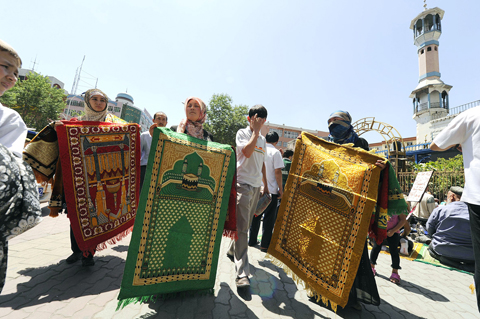China has installed about 40,000 high-definition surveillance cameras in the western region of Xinjiang days before the one year anniversary of the country's worst ethnic violence in decades.
The security cameras with “riot-proof” protective shells will be monitored by police at more than 4,000 public locations, including on city streets and buses and in schools and shopping malls, city government spokesman Ma Xinchun (馬新春) said yesterday.
Long-simmering tensions between Xinjiang's minority Uighurs and majority Han Chinese migrants turned into open violence in the streets of Urumqi — the capital of the traditionally Muslim region — in July last year. The government says 197 people were killed. Beijing blamed overseas Uighur groups of plotting the violence, but exile groups denied it.

PHOTO: AFP
China appeared caught by surprise a year ago when anger over a brawl between Uighurs and Han in another part of the country boiled over despite Xinjiang's typically high police presence and tight Internet monitoring. After the July 5 violence, the region's Internet, international telephone and text messaging links to the outside world were not restored for more than half a year.
The installation of thousands of surveillance cameras follows an ongoing crackdown on violent crime launched there last month, as well as the hiring of about 5,000 new police officers in Xinjiang.
“You can see more police patrolling and carrying rifles,” a woman surnamed Jing said by phone yesterday from Urumqi’s Hongshan New Century Shopping Center, where she works. “If you walk down any street, you see them every once in a while, often in groups.”
People are carrying their identification cards everywhere and those from outside the city must get a temporary residence card, which authorities have been checking strictly, an operator surnamed Liu said at Urumqi's Torch Hotel.
Beijing labels those opposing Chinese authority over Xinjiang as “terrorists.” Late last month, it announced it uncovered a gang of “hardcore terrorists” who it said had plotted attacks in southern Xinjiang cities between July and October last year. Chinese Ministry of Public Security spokesman Wu Heping (武和平) took no questions from reporters and his assertions could not be independently verified.
The announcement came a day after local officials launched a “Love the great motherland, build a beautiful homeland” patriotic education campaign aimed at establishing that “the ethnic minorities are inseparable from the Han.”
The Washington-based Uyghur Human Rights Project (UHRP) yesterday called for the Chinese government to support an independent, international investigation into last year's violence. The group also asked the government to release Uighurs it says have been detained without charge, end the use of crackdowns and address the issues behind the region's tensions.
“Government accounts of the unrest in Urumqi in July and September have consistently demonized Uighurs as violent criminals and terrorists, and Urumqi residents told UHRP that government propaganda fanned public hatred against Uighurs and deepened ethnic discord in the city,” the group said.
China’s leaders say all ethnic groups are treated equally and point to the billions of dollars in investment that has modernized the strategically vital region with significant oil and gas deposits. In May, the government announced plans to inject nearly US$1.5 billion into the region, starting next year.

AIR SUPPORT: The Ministry of National Defense thanked the US for the delivery, adding that it was an indicator of the White House’s commitment to the Taiwan Relations Act Deputy Minister of National Defense Po Horng-huei (柏鴻輝) and Representative to the US Alexander Yui on Friday attended a delivery ceremony for the first of Taiwan’s long-awaited 66 F-16C/D Block 70 jets at a Lockheed Martin Corp factory in Greenville, South Carolina. “We are so proud to be the global home of the F-16 and to support Taiwan’s air defense capabilities,” US Representative William Timmons wrote on X, alongside a photograph of Taiwanese and US officials at the event. The F-16C/D Block 70 jets Taiwan ordered have the same capabilities as aircraft that had been upgraded to F-16Vs. The batch of Lockheed Martin

GRIDLOCK: The National Fire Agency’s Special Search and Rescue team is on standby to travel to the countries to help out with the rescue effort A powerful earthquake rocked Myanmar and neighboring Thailand yesterday, killing at least three people in Bangkok and burying dozens when a high-rise building under construction collapsed. Footage shared on social media from Myanmar’s second-largest city showed widespread destruction, raising fears that many were trapped under the rubble or killed. The magnitude 7.7 earthquake, with an epicenter near Mandalay in Myanmar, struck at midday and was followed by a strong magnitude 6.4 aftershock. The extent of death, injury and destruction — especially in Myanmar, which is embroiled in a civil war and where information is tightly controlled at the best of times —

Taiwan was ranked the fourth-safest country in the world with a score of 82.9, trailing only Andorra, the United Arab Emirates and Qatar in Numbeo’s Safety Index by Country report. Taiwan’s score improved by 0.1 points compared with last year’s mid-year report, which had Taiwan fourth with a score of 82.8. However, both scores were lower than in last year’s first review, when Taiwan scored 83.3, and are a long way from when Taiwan was named the second-safest country in the world in 2021, scoring 84.8. Taiwan ranked higher than Singapore in ninth with a score of 77.4 and Japan in 10th with

China's military today said it began joint army, navy and rocket force exercises around Taiwan to "serve as a stern warning and powerful deterrent against Taiwanese independence," calling President William Lai (賴清德) a "parasite." The exercises come after Lai called Beijing a "foreign hostile force" last month. More than 10 Chinese military ships approached close to Taiwan's 24 nautical mile (44.4km) contiguous zone this morning and Taiwan sent its own warships to respond, two senior Taiwanese officials said. Taiwan has not yet detected any live fire by the Chinese military so far, one of the officials said. The drills took place after US Secretary